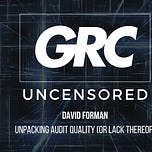Catch this episode on Apple, Spotify, Amazon, or YouTube.
You can read the show recap here.
In this episode of GRC Uncensored, hosts Troy Fine and Kendra Cooley, along with producer Elliot Volkman, continue their pursuit of trying to understand what is explicitly holding the GRC world back. Joined by ISO expert and former EY auditor David Foreman, the discussion tackles the roles of auditors, tech vendors, and market forces in shaping audit quality.
They explore the significance of audit integrity, the staying power of governance programs, and the varying expectations of companies undergoing audits. Amidst an insightful dialogue, the hosts debate the future of automated compliance tools, check-the-box audits, and the elusive definition of audit quality. Ultimately, the episode underscores the issue's complexity, emphasizing that it's not just about the vendors or auditors but also market demands and expectations.
Key Takeaways
Align Audit Quality with Strategic Objectives: Use audits as a strategic advantage, not merely a compliance necessity.
Embrace Technology: Leverage data analytics to shift from reactive to proactive GRC practices.
Think Beyond Compliance: Foster a culture of trust and transparency to enhance market credibility.
Resource Rebalancing: Optimize internal resource allocation to address regulatory complexity without compromising other strategic initiatives.
Understanding Audit Quality: Beyond Perception
Audit quality is a cornerstone of Governance, Risk, and Compliance (GRC). Its perception can either strengthen a program's credibility or weaken its core efforts. Many business leaders view audit quality as an assurance mechanism—a vital checkpoint providing a sense of control over business risks. However, this week, we discuss a crucial distinction: the perception of audit quality doesn't always match its reality.
Troy and Kendra explore how pursuing high audit quality often requires a delicate balancing act. It demands rigorous standards to ensure compliance and mitigate risks while contending with the pressures of time, resources, and human limitations. This raises a key question: How can GRC professionals manage these dynamics to prevent the complexity of the task from overshadowing audit quality?
The Powerful Link Between Audit Quality and Market Demand
High-quality audits, though challenging, can dramatically increase market trust. By ensuring transparency and accuracy, companies bolster confidence among investors, clients, and regulators. As such, audit quality isn't just a compliance tool—it's a powerful force that solidifies a firm's reputation in the marketplace.
Businesses investing in advanced audit technologies, such as data analytics and AI-driven insights, are ahead in protecting their interests while fulfilling compliance duties. These advancements pave the way for a more proactive rather than reactive approach, aligning market demands with robust GRC practices.
Governance, Risk, and Compliance are not static concepts bound by the walls of regulatory requirements. Instead, they are dynamic frameworks that, when executed effectively, drive business resilience and market success. Plainly said, it’s not fair or adequate to blame a single source on audit quality (vendors or firm standards), whereas audit oversights set a low bar to begin with. However, what appears to be the most significant driving force is the market. Like most financially-driven activities, market demand dictates the standards and quality necessary to meet its needs. So, there is a place for lower quality audits, primarily for first-time entries to compliance, but it’s unlikely to receive a passing grade when put to the test by enterprise organizations that prioritize security or are risk-averse.
The Market Yearns for Low Quality Audits (Sometimes)
If the market yearns for low-quality audits, even if they functionally negate their intent, what are some driving forces behind it? Several factors contribute to the overall quality of an audit based on this conversion, so don’t view this as an exhaustive list:
Auditor Expertise and Integrity
The knowledge and integrity of the auditors themselves are fundamental to audit quality. Working with auditors who are well-versed in the standards and can apply them practically to specific situations is essential, as there are many different frameworks. An auditor's ability to understand and evaluate an organization's tech stack and dive deep into controls is crucial for a thorough assessment.
Audit Firm Reputation
The reputation of the audit firm significantly impacts the perceived quality of the audit. Some professionals admit to disregarding reports from certain firms known for their rubber stamp approach. This highlights the importance of choosing a reputable audit partner that can provide a credible and thorough assessment.
Audit Procedures and Depth
The depth and thoroughness of audit procedures directly affect quality. While some standards may not require extensive sampling, a more comprehensive approach can add value to the audit process. Balancing between meeting minimum requirements and providing in-depth insights is crucial for maintaining audit quality.
Client Education and Engagement
Educating clients about the audit process and its importance contributes to better audit quality. When clients understand the value of the audit beyond mere compliance, they are more likely to engage meaningfully in the process.
Market Expectations and Customer Requirements
Market expectations and customer requirements also influence audit quality. Organizations need to consider not just the minimum standards, but also what their customers and prospects expect regarding security and compliance measures.
Balancing Cost and Quality
There's often a trade-off between cost and quality in audits. While cheaper options exist, they may not provide the same level of thoroughness or value-added insights as more expensive, comprehensive audits. Organizations must carefully consider this balance based on their needs and objectives.
Regulatory Standards and Industry Best Practices
Staying current with regulatory changes and adapting audit procedures accordingly is essential for maintaining high-quality audits.
Communication and Transparency
Open communication between the audited organization, the auditors, and other stakeholders is crucial for audit quality. Transparency about control environments, decision-making processes, and expectations helps align all parties and contributes to a more effective audit.
















Share this post